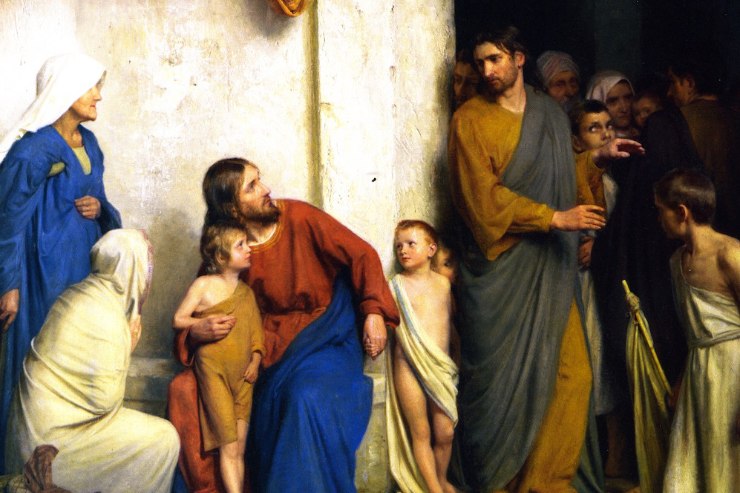All of Life is Bittersweet
by Jeannie Ewing | December 13, 2017 12:04 am

“Suffer the little children to come unto me.” (detail) by Carl Bloch [Public domain], via Wikimedia Commons[1]
Come, Lord, and tarry not;
Bring the long looked-for day;
Why these years of waiting here,
These ages of delay?
(Advent hymn)
I left the neuropsychologist’s office dumbfounded. If Sarah had received a diagnosis of autism, I would have understood. If ADHD had been a resounding secondary diagnosis to her Apert syndrome, I wouldn’t have flinched. But, in fact, I never considered the possibility that my daughter is cognitively impaired. For some, this wouldn’t be a shock or disappointment, but to me, it was both.
Grief, in my life, can be a quiet, but noticeable summer breeze that makes its presence known but does not inflict pain. At other times, it can be a tsunami that crashes over my heart without warning or apology, creating yet another chasm of loneliness, darkness. That day, it was the tsunami.
Sarah and I left the office together, she in her typical chipper mood, and I feeling as if a cloud of doom decided to plant itself permanently above my head. It didn’t feel like Advent to me—more like Lent. But the agony of waiting, the agony of expectancy, never leaves me.
Perhaps the void I so often notice in my heart is that longing for God, for heaven, for something greater than where I am now. It’s more than nostalgia; it’s a certain knowing that God always fulfills His promises and never leaves me alone. Even though I feel like our family is entering new territory yet again with Sarah’s nebulous condition, I have to live by way of obscure faith—a faith that is not clear but is certain.
A broken heart does not always heal when seasons of joy and mirth appear. Sometimes we realize, in our poverty of spirit, that our nothingness and wounds are revealing such weakness. It is a weakness we don’t often believe can be redeemed. But it has, and it is.
I muse a bit on the birth of Jesus, and there is hope for me, for Sarah, for our family and future. There is nothing more vulnerable than a helpless infant, so dependent and so forgiving. If I approach the throne of the manger with my poverty, if all I have to give Him is my broken heart, I know He will receive it with joy and gratitude—as I must receive Him and all this life has to offer in the same way.
It’s not enough for me to rejoice when life goes smoothly or blessings fall into place one after another. True faith, authentic love, requires something more radical—a confidence in God’s goodness when all seems lost, much like life must have appeared those generations long ago before the Annunication, before the Visitation, before the Incarnation.
Even if you are weary this Advent or have allowed the anxieties of daily life to make you interiorly drowsy, do not lose hope. We do wait for Him, and in life we linger in an undefined place of tension and uncertainty. In that womb of darkness, we know the Light will be born again and again in us. He will not tarry much longer. He will not delay to bring our longings to fruition—in His time and in His way.
So I rejoice today, though my heart is breaking. It’s not the first time and won’t be the last. But all my pain—and yours, too—has been redeemed by the fiat of a humble carpenter’s wife and the surrender of a tiny infant who was born to give us hope in the beauty of the Cross.
Perhaps, like me, life feels more like a mingling of Advent and Lent, but I think it’s supposed to. Suffering and joy are not often separated; as we gain wisdom and stature, we learn that all of life is bittersweet. We partake in the sweet consolations of Advent while also accepting the bitter herbs of Lenten tears. Let us recall the words heralded by St. Gabriel to Zechariah in the Holy of Holies and to our Blessed Mother, “Do not be afraid.”
“We will run and not grow weary, walk and not grow faint” (Isaiah 40:31).
Text (c) Jeannie Ewing 2017, all rights reserved.
 [2]Please share on social media.
[2]Please share on social media.
- via Wikimedia Commons: https://commons.wikimedia.org/wiki/File%3ALet_the_Little_Children_Come_unto_Jesus.jpg
- [Image]: http://www.integratedcatholiclife.org/donate/
Source URL: https://integratedcatholiclife.org/2017/12/ewing-all-of-life-is-bittersweet/